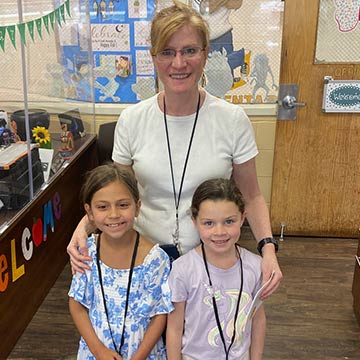Our Principal
Suzanne Barbi is the principal at Parkway School. She began her love of learning by earning a Bachelor of Arts in history from Providence College. After a short career in finance, Mrs. Barbi received her master’s in the science of education from Fordham University. She then taught K–4 grade students at P.S. 49 in the South Bronx. As Mrs. Barbi’s leadership responsibilities expanded, she left NYC to pursue her second master’s in education at Harvard University, where she received her degree as well as her principal certification.
After returning to New Jersey, Mrs. Barbi served as an assistant principal, principal, and curriculum coordinator in other northern New Jersey school districts. In 2009, Mrs. Barbi became the principal at Parkway School and found her permanent home as the leader of an amazing community of learners. Mrs. Barbi is committed to creating kind, responsible, thoughtful citizens at Parkway School and thoroughly enjoys her role.
A Message from the Principal
Dear Parkway Families,
March brings report cards and parent-teacher conferences, a valuable opportunity to pause and reflect on your child’s growth. As both a principal and a parent, I like to think of report cards as snapshots. They show progress at a moment in time, but they don’t capture the full picture of effort, resilience, curiosity, and character. That fuller story comes through conversation and partnership between home and school.
Before your conference, take a few minutes to talk with your child about their learning. Ask what they are most proud of, what feels easy right now, and what feels challenging. Encourage them to share where they feel confident and where they struggle. Most importantly, listen carefully to their perspective without rushing to fix or correct. When children reflect on their strengths and challenges, they build important self-awareness skills that research shows are closely tied to long-term success.
During your conference, consider asking the teacher about your child’s strengths, classroom contributions, and areas for growth. You might ask what skills to prioritize, how independent your child is during work time, or how you can reinforce learning at home. Conferences are most powerful when they focus not just on grades, but on growth and next steps.
Afterward, include your child in setting a small, specific goal. When students help shape their own goals, they are more motivated and invested in reaching them. A simple plan, like reading nightly or practicing math facts a few times a week in the car on the way to extracurricular activities can make a meaningful difference.
March can be busy, but consistent family conversations about learning matter more than any single report card. A few intentional minutes together, ideally with screens set aside, can go a long way in helping children feel supported, capable, and understood. Report cards inform us, but relationships and reflection move us forward.
Take care,
Suzanne Barbi
Suzanne Barbi
Principal
Parkway Elementary School


